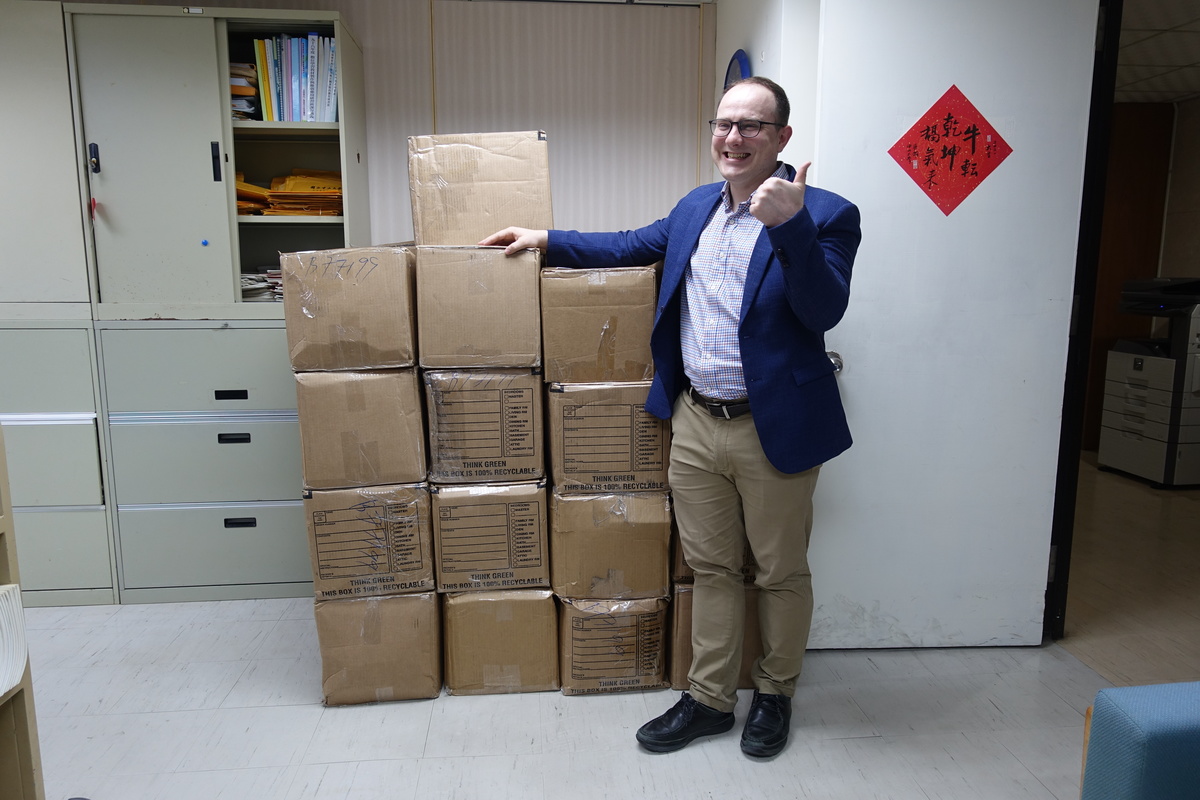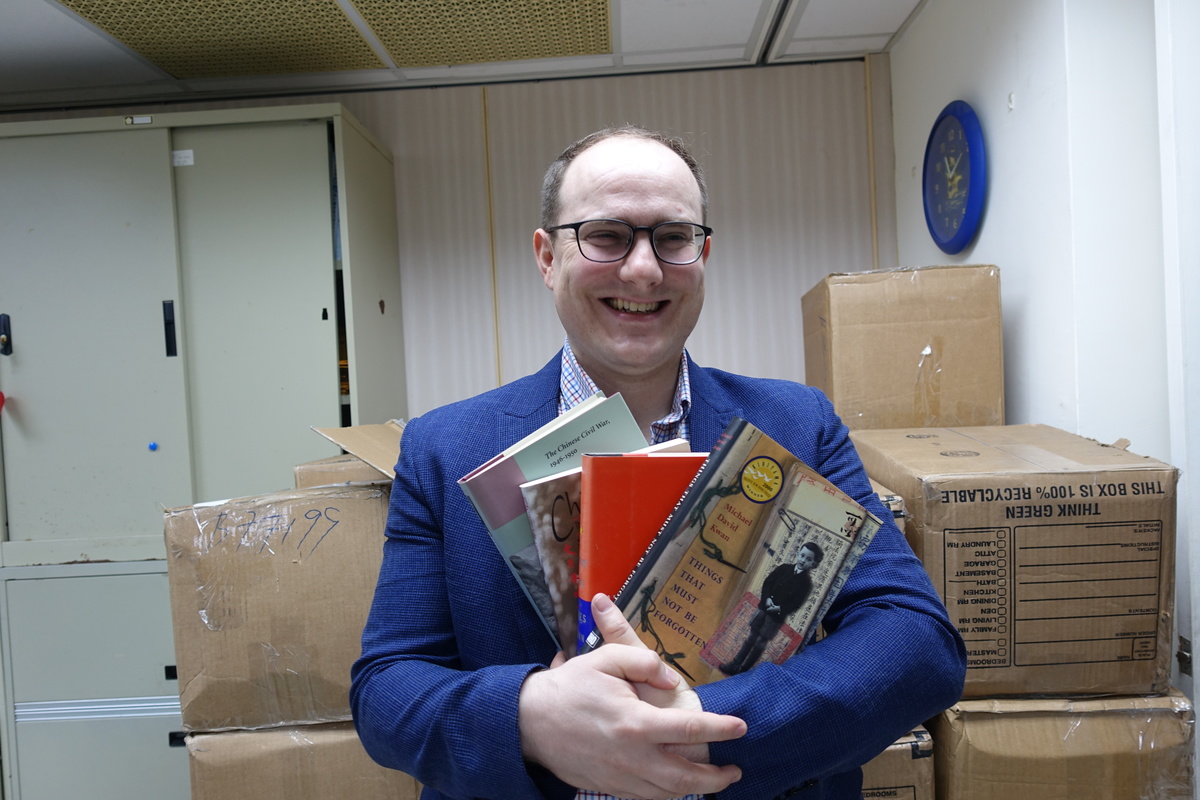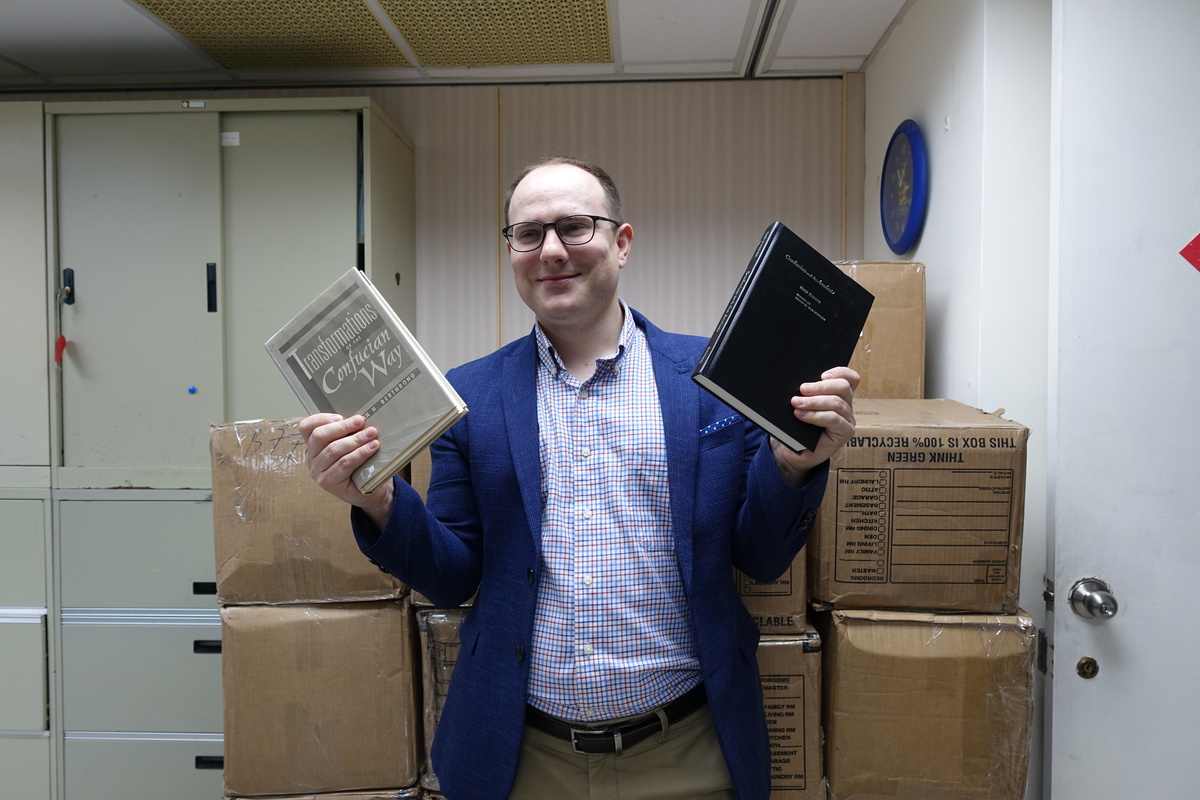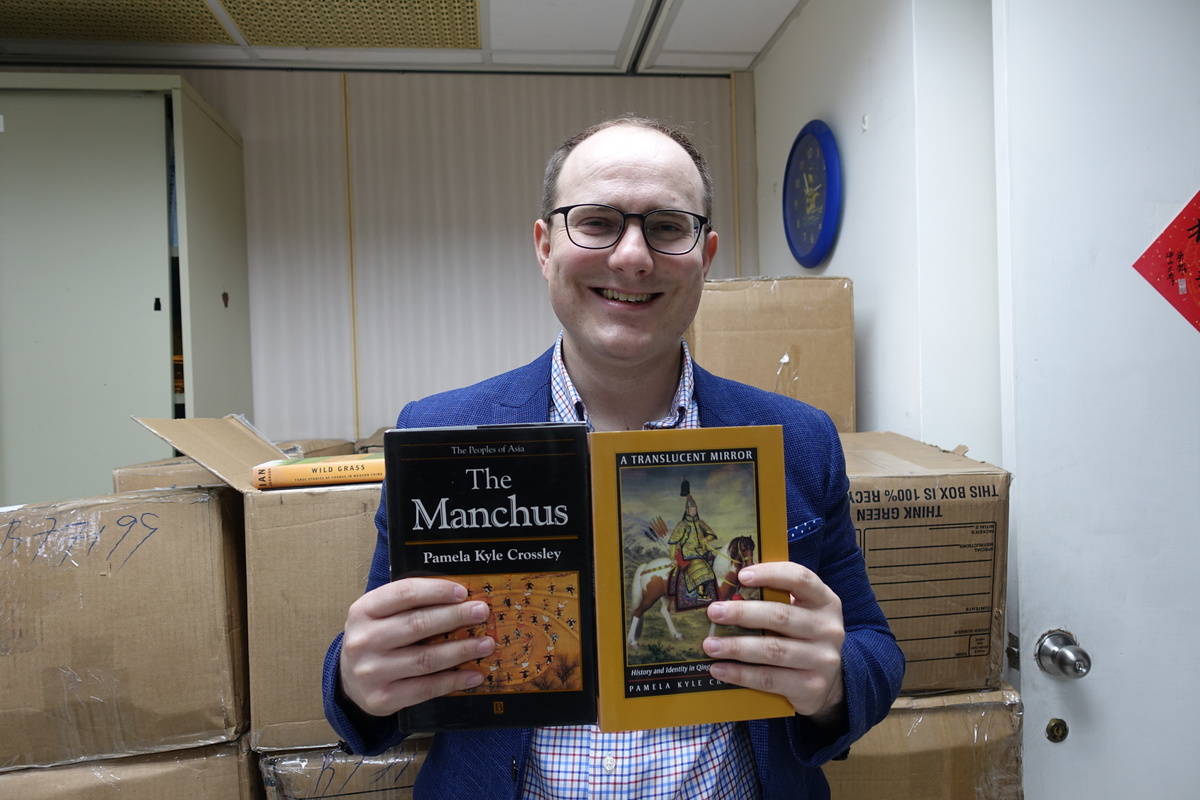Donation of 1200 books to support global sinology studies at NSYSU




2021-03-04
Charles Horner, a noted sinologist and former US State Department Official, donated approximately 1200 predominately English language books on Chinese history, culture, and literature to the Department of Chinese Literature (DCL) at NSYSU to support its plans for teaching and researching sinology from an international perspective. NSYSU President Ying-Yao Cheng expressed his deep appreciation for this valuable donation and said that free and democratic Taiwan acts as an important international center for sinology in the 21st century. The books will be available at the Library and will be used as teaching materials for new courses, as the University works to become a center for international exchange in global sinology in Taiwan.
Mr. Horner, retired after a long career spent in government, think-tank based research, and education, decided to donate his collection of books to support future generations of students in their studies. “My main consideration was whether the books would be put to good use”, he recalled. Mr. Horner left a post about the planned donation on an online platform for scholarly exchange. Assistant Professor Mark McConaghy of the DCL replied to Horner’s call immediately, explaining how the books could fit into NSYSU’s plans for growing their course offerings in global sinology.
The donation is a significant contribution to the library resources at NSYSU. “These books represent the most important work on the Chinese past and present that has been produced in the English language and include works of such luminaries as Joseph Levenson, Joseph Needham, Germie Barmé, Philip Kuhn, Frederic Wakeman, Wen-Hsin Yeh, John K. Fairbank, Andrew Plaks, Francesca Bray, Benjamin, Schwartz, Elizabeth Perry, James Peck, Lydia Liu, Dorothy Ko, Rebecca Karl, Pamela Kyle Crossley, Joseph Esherick, David Der-wei Wang, Philip Huang, among many others,” said Professor McConaghy. He said that the books will serve as materials to teach sinology from a global perspective. “What we are going to do with these books is connect Chinese language materials on Chinese history, literature, and culture with the broader global discourse of Chinese studies that have developed as a professionalized academic field over the 20th century.”
In recent years, the DCL has employed an ever great number of faculty members with international backgrounds and networks to strengthen NSYSU’s ties with academic circles abroad. Professor McConaghy said that in the near future, DLC will establish a new course pathway in global sinology, an international sinology database, and organize numerous events and lectures on global sinology this year. Professor McConaghy himself teaches a wide variety of courses in English and Chinese from a global approach, including Western Sinology, Modern Chinese Literature and Society, Topics in Global Chinese Literature, Taiwan Literature and the Modern World, and Chinese-English Translation: Theory, History, and Practice.
President Cheng pointed out that after 1949, Taiwan has become an international center for sinology, fostering important academic work regarding the philosophical moorings, family structure, religious beliefs, classical and modern literary traditions, and affective life – the world of Sinitic speaking peoples in Taiwan and abroad. Generations of foreign students from all over the world came to Taiwan to learn to read the Sinitic script and to speak a variety of Sinitic oral languages. He further said that with this global and intercultural mindset, NSYSU cooperates with institutions conducting sinological studies in countries spreading from East Asia to America and Europe. Professor McConaghy added that although China started to open up in 1978 and has been attracting many foreign students and scholars, Taiwan continues to play its role as an important center for global sinology, as it is “a democratic, free country that in the course of its complicated history synthesized within its academic institutions and popular culture some of the most profoundly humane elements of traditional Chinese culture, and integrated them with modern values of democracy, gender equality and liberation, social tolerance, and intellectual freedom, ” he said.
Why is it so important to study sinology from a global perspective? “Sinology can include different perspectives of scholars from all over the world and be a broad, open discipline. The knowledge of China and research on its history can help us address modern problems, such as epidemics, ethics, climate change, the disparity between the rich and poor, and many other problems”, explained Professor McConaghy. Mr. Horner added that “it always valuable to learn how one’s own country is viewed by people outside of it. My books represent only a small part of the big picture.”
Mr. Horner’s career has intersected in important ways with China. In the 1980s, serving as Deputy Assistant Secretary of State and later as Associate Director of the U.S. Information Agency, he helped craft US policy towards China. Before his career in the government, Horner began his entry into Chinese studies by studying under famed sinologist Derk Bodde (1909-2003) at the University of Pennsylvania. He obtained a graduate degree in Chinese Studies from the University of Chicago, working among such towering intellectual figures in the field as Ho Ping-ti (1917-2012). He came to Taiwan during his time in graduate school, studying at National Taiwan University. After he left government, he dedicated himself to an academic career in sinology and is now a Senior Fellow at the Hudson Institute.
The donation of the books will be celebrated in an online conference with Charles Horner on April 20th. The University will also invite Horner to visit the campus and share his experience as a China researcher as soon as travel restrictions are lifted.
Charles Horner, a noted sinologist and former US State Department Official, donated approximately 1200 predominately English language books on Chinese history, culture, and literature to the Department of Chinese Literature (DCL) at NSYSU to support its plans for teaching and researching sinology from an international perspective. NSYSU President Ying-Yao Cheng expressed his deep appreciation for this valuable donation and said that free and democratic Taiwan acts as an important international center for sinology in the 21st century. The books will be available at the Library and will be used as teaching materials for new courses, as the University works to become a center for international exchange in global sinology in Taiwan.
Mr. Horner, retired after a long career spent in government, think-tank based research, and education, decided to donate his collection of books to support future generations of students in their studies. “My main consideration was whether the books would be put to good use”, he recalled. Mr. Horner left a post about the planned donation on an online platform for scholarly exchange. Assistant Professor Mark McConaghy of the DCL replied to Horner’s call immediately, explaining how the books could fit into NSYSU’s plans for growing their course offerings in global sinology.
The donation is a significant contribution to the library resources at NSYSU. “These books represent the most important work on the Chinese past and present that has been produced in the English language and include works of such luminaries as Joseph Levenson, Joseph Needham, Germie Barmé, Philip Kuhn, Frederic Wakeman, Wen-Hsin Yeh, John K. Fairbank, Andrew Plaks, Francesca Bray, Benjamin, Schwartz, Elizabeth Perry, James Peck, Lydia Liu, Dorothy Ko, Rebecca Karl, Pamela Kyle Crossley, Joseph Esherick, David Der-wei Wang, Philip Huang, among many others,” said Professor McConaghy. He said that the books will serve as materials to teach sinology from a global perspective. “What we are going to do with these books is connect Chinese language materials on Chinese history, literature, and culture with the broader global discourse of Chinese studies that have developed as a professionalized academic field over the 20th century.”
In recent years, the DCL has employed an ever great number of faculty members with international backgrounds and networks to strengthen NSYSU’s ties with academic circles abroad. Professor McConaghy said that in the near future, DLC will establish a new course pathway in global sinology, an international sinology database, and organize numerous events and lectures on global sinology this year. Professor McConaghy himself teaches a wide variety of courses in English and Chinese from a global approach, including Western Sinology, Modern Chinese Literature and Society, Topics in Global Chinese Literature, Taiwan Literature and the Modern World, and Chinese-English Translation: Theory, History, and Practice.
President Cheng pointed out that after 1949, Taiwan has become an international center for sinology, fostering important academic work regarding the philosophical moorings, family structure, religious beliefs, classical and modern literary traditions, and affective life – the world of Sinitic speaking peoples in Taiwan and abroad. Generations of foreign students from all over the world came to Taiwan to learn to read the Sinitic script and to speak a variety of Sinitic oral languages. He further said that with this global and intercultural mindset, NSYSU cooperates with institutions conducting sinological studies in countries spreading from East Asia to America and Europe. Professor McConaghy added that although China started to open up in 1978 and has been attracting many foreign students and scholars, Taiwan continues to play its role as an important center for global sinology, as it is “a democratic, free country that in the course of its complicated history synthesized within its academic institutions and popular culture some of the most profoundly humane elements of traditional Chinese culture, and integrated them with modern values of democracy, gender equality and liberation, social tolerance, and intellectual freedom, ” he said.
Why is it so important to study sinology from a global perspective? “Sinology can include different perspectives of scholars from all over the world and be a broad, open discipline. The knowledge of China and research on its history can help us address modern problems, such as epidemics, ethics, climate change, the disparity between the rich and poor, and many other problems”, explained Professor McConaghy. Mr. Horner added that “it always valuable to learn how one’s own country is viewed by people outside of it. My books represent only a small part of the big picture.”
Mr. Horner’s career has intersected in important ways with China. In the 1980s, serving as Deputy Assistant Secretary of State and later as Associate Director of the U.S. Information Agency, he helped craft US policy towards China. Before his career in the government, Horner began his entry into Chinese studies by studying under famed sinologist Derk Bodde (1909-2003) at the University of Pennsylvania. He obtained a graduate degree in Chinese Studies from the University of Chicago, working among such towering intellectual figures in the field as Ho Ping-ti (1917-2012). He came to Taiwan during his time in graduate school, studying at National Taiwan University. After he left government, he dedicated himself to an academic career in sinology and is now a Senior Fellow at the Hudson Institute.
The donation of the books will be celebrated in an online conference with Charles Horner on April 20th. The University will also invite Horner to visit the campus and share his experience as a China researcher as soon as travel restrictions are lifted.
Click Num:
Share
